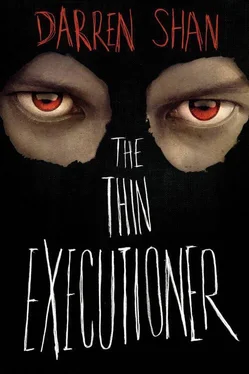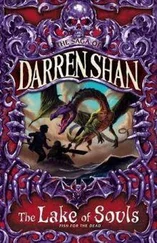Tel Hesani frowned. “Are you certain?”
Hubaira nodded weakly. “My body… is nothing. But don’t… leave my… head.”
She shook again, and though she still hadn’t surrendered to death by the time she stopped shaking, she couldn’t speak anymore. She lay staring at the walls of the siq, the fireflits, the sky. She tried raising a finger to point at something, but her hand fell by her side before the gesture was complete. Jebel and Tel Hesani looked to see what she was trying to draw their attention to but could see nothing. When they turned back to Hubaira, she was dead.
They camped by the two corpses overnight, too battle-weary to withdraw. Tel Hesani slept soundly, concussed from his beating at the claws of the mamlah. But Jebel was awake for most of the night. His brush with death had left him afraid to face his dreams in case he met the mamlah again in them.
Early in the morning they rose. Tel Hesani studied Hubaira’s body, sword held by his side indecisively. “Do you think she was serious about severing her head?”
Jebel nodded, then sneered at the slave. “Afraid to cut it off?”
“No. But if she spoke in error — if the pain and shock made her say something she didn’t mean — her people might execute us for violating her corpse.”
Jebel nervously scratched his cheek. “If we don’t tell them that we met her…”
“You wish to lie, my lord?” Tel Hesani asked, and now it was his turn to sneer.
Jebel flushed angrily, then scowled and waved at the body. “Just chop the damn thing off. It was what she wanted. If they kill us for honoring her last wish, so be it.”
Tel Hesani bent, placed his sword on the dead girl’s neck, and sliced through as cleanly as he could, gently moving the blade back and forth over the cold flesh. He took an empty bag and carefully placed Hubaira’s head in it.
Tel Hesani asked Jebel if he wanted breakfast, but the um Wadi wasn’t hungry. While the slave gathered their belongings, Jebel examined the mamlah. It looked smaller in the daylight, more like a tiger than a bear, but its claws were still long and sharp. He shivered as he thought about how close the fight had been.
They departed, Tel Hesani carrying the head, leaving Hubaira’s body and the mamlah for the birds of prey and any other passing animals to feed upon and scatter as they might.
They marched in silence. Tel Hesani’s bruises throbbed, and the scratches on his face and neck stung, but he forced the pace, not wanting to spend another night in the siq.
Jebel took no notice now of the beautiful colors and shapes of the rocks. Every time he looked up he was reminded of the battle and Hubaira’s bloody end, so he kept his eyes down, focusing on the ground.
Finally, shortly before sunset, they turned a bend and came upon the city that lay at the heart of Abu Siq. They were taken aback by its sudden appearance, and both stopped short and stared. The city was spread across a valley, surrounded on all sides by snowcapped mountains. Most of the houses were built from multicolored rocks, covered in layers of dust, but some were carved into the mountains.
Jebel and Tel Hesani stood gazing at the houses, studying the layout of the city. There seemed to be no center as such. The houses all looked much the same. Tel Hesani glanced at Jebel. “We either go in and request passage, or wait for night and try to sneak past.”
“We’ll go in,” Jebel said instantly. He would rather be beheaded by the Um Siq than ripped to pieces by a mamlah.
They started down the slope. They could see people moving on the streets, but they didn’t think that the Um Siq were aware of them. It was only when they came upon the first house and a band of warriors stepped out, blocking their path, that they realized they’d been watched all along. Jebel counted nineteen men and women, the standard regiment size in Abu Siq ever since the time of the nineteen survivors of the invasion that Hubaira had told them about.
One of the men stepped forward. His sword wasn’t drawn, but his hand was close by its hilt. “Strangers are not welcome here,” he said.
Tel Hesani returned the man’s cold stare but said nothing.
“Who are you?” the Um Siq snapped. “What do you want?”
In response, Tel Hesani unstrapped the bag containing Hubaira’s head and said, “I wish to speak to the family of Hubaira.”
The man blinked, then glanced at the bag. He considered the stranger’s request, then nodded at a man on the far left of the line. The man peeled away and hurried into the city. Nobody said anything while he was gone.
A short while later, a woman and three men appeared. The woman advanced, the men just behind her, and stopped a couple of strides short of Tel Hesani. “I am Qattar,” she said. “Hubaira’s mother.”
Tel Hesani opened the bag and pulled the sides down, revealing Hubaira’s face. Jebel expected startled gasps, but the dead girl’s mother stared evenly at the head as if it was nothing to get excited about.
Eventually Qattar’s gaze rose and she said, “How?”
“Against a mamlah,” said Tel Hesani. “She asked us to bring you her head.”
“How did you come to be traveling together?” one of the men asked.
“We met her at the mouth of the siq,” Tel Hesani explained. “We told her we were on a quest and had to pass through here. She said that she would present us to her elders, who could decide whether or not to let us advance.”
“Did she kill the mamlah?” Qattar asked.
“No. All three of us worked as a team to bring it down.”
“But of the three of you, only she died,” Qattar said. It was impossible to tell if her words were a challenge or a simple observation.
Tel Hesani shrugged. “Luck was with us and against her.”
There was a long, dangerous pause. Then Qattar took her daughter’s head. “You have my thanks for bringing us this.” Turning, she headed back to her home.
Qattar’s three husbands bowed to Jebel and Tel Hesani. One of them said, “You are welcome here now. Will you break bread with us?”
“It would be an honor,” Tel Hesani said, then he and Jebel followed the men into the city, ignoring the suspicious squints of the soldiers.
The man who had addressed them was Ramman, Hubaira’s father. He and Qattar ate with Jebel and Tel Hesani while the other husbands ate elsewhere. Although Um Siq women had more than one mate, they didn’t share a house with them. Each husband had separate living quarters, and the women divided their time between them.
The house was sparsely decorated. The walls were unpainted — there was no need for paint when you had all the colors of the siq to choose from — and there were no curtains or shutters on the windows. There was one rug and a small table. No chairs. Qattar and Ramman sat cross-legged on the floor, and their guests did likewise.
After a short conversation, in which Tel Hesani told the Um Siq of their quest (not mentioning the fact that he was a slave due to be slaughtered if they made it to Tubaygat), Qattar prepared their meal. She came back with two plates piled high with raw meat. She set the food between the four of them, then picked a slice and bit into it. Ramman chose a piece, then nodded at Jebel and Tel Hesani. The slave took a thick slice and attacked it ravenously. Jebel was less enthusiastic. He chose the thinnest slice he could find and steeled himself to force it down. But when he bit in, he was surprised by the sweet taste. The meat had been seasoned with herbs and spices and was nowhere near as unappealing as it looked.
Qattar had placed the bag with Hubaira’s head close to the door, and there it stayed for the duration of the meal. Neither she nor Ramman seemed saddened by the death of their daughter. Jebel thought that curious, but he said nothing. Maybe she had disgraced them by dying before she’d passed her tests. Or perhaps they hadn’t liked her much in the first place.
Читать дальше







